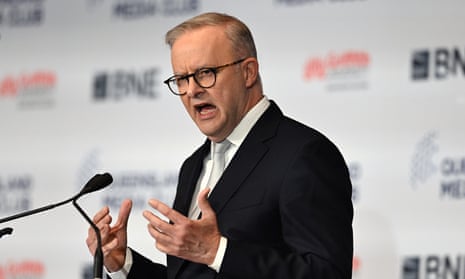Anthony Albanese ‘taken aback’ by Peter Dutton’s comparison of Opera House protest to Port Arthur massacre

Sarah Basford Canales
At the Queensland Media Club this afternoon, Anthony Albanese was asked by Guardian Australia reporter, Eden Gillespie, about his eyebrow-raising speech last night.
Gillespie asked:
Peter Dutton has blamed police and Labor for the rise in antisemitism. He said police were going soft on people and that you had been too weak. What do you think of those allegations? And of Mr Dutton using the Gaza issue to make domestic political criticisms?
The prime minister responded:
I think that Peter Dutton’s reference to Port Arthur … people will draw their own conclusions about that. I did see those comments and was somewhat taken aback by those comments. And it’s up to him to explain that.
I’m someone who has spent time, including recently in Parliament House, with the family of victims of Port Arthur. And I think that sometimes what Peter Dutton does in his comments, is to think about how hard you could possibly go and how angry you could possibly be – and then go one step further.

Last night, Dutton likened the 9 October protests against Israel’s initial response to Hamas’s 7 October attack to the shooting murder of 35 people at Tasmania’s Port Arthur historic site in 1996, which heralded tougher gun laws in Australia.
While no one was killed during the 9 October protests, the events at the Sydney Opera House were akin to a Port Arthur moment in terms of their social significance.
Key events

Elias Visontay
Sydney’s second airport is nearing the final stages of construction, as the authorities carve up land for housing and businesses to support the new precinct in western Sydney.
On Thursday, local leaders as well as state and federal ministers gathered at the Western Sydney Leadership Dialogue’s Airport City Summit to discuss the future of the Western Sydney International (WSI) Airport precinct.
The New South Wales government unveiled a land release for 1,000 homes in Bradfield – the name for the new CBD anchoring the precinct.
Federal transport minister Catherine King revealed the airport was on track for its 2026 opening, and was near 75% completed.
“I can report that as at 29 February 2024, WSI is 73% complete and on track to commence on schedule in 2026 – initially capable of catering for up to 10 million annual passengers,” King said.
Two hospitalised, one critical after stabbing in south-west Sydney
A 25-year-old man is under police guard in hospital while a man and woman remain in critical condition following a stabbing in Sydney’s south-west, AAP reports.
Emergency services were called to a unit on Ninth Avenue at Campsie shortly before 9pm last night, where they found a 53-year-old woman with knife wounds to her thigh and a 46-year-old man who had been stabbed in the face, arm and chest.
Both were taken to hospital, the man in a critical condition.
A 25-year-old man was arrested by police and also taken to hospital where he remains under guard.
A crime scene has been established and investigations are ongoing.

Emily Wind
Many thanks for joining me on the blog today. The lovely Kate Lyons will be here to take you through the rest of our rolling coverage. Take care!

Peter Hannam
China’s inflation all but stalled in March – and that’s not a good thing
As we noted in an earlier post, inflation in the US rose more than expected in March, rising 0.4% rather than the 0.3% economists had expected. From a year earlier, prices were up 3.5%.
Well, the second-biggest economy in the world, China’s, has the opposite problem. Economists had forecast inflation there to rise 0.4% from a year earlier, but it came in at just 0.1%. Inflation, in other words, was tilting back towards deflation.
February’s 0.7% year-on-year rise in prices now looks like a bit of lunar new year blip (and perhaps, so much fortuitous number crunching by the stats bureau to bolster spirits soon after the annual Communist party gathering in Beijing).
Expect more calls for the Chinese government to step up spending to revive the sagging economy. Perhaps Australia-like stimuli to “go early, go hard, go households” might eventually be the path taken, though it might be more a case of “go sooner or later”.
Anyway, to the extent demand from China for Australian exports sinks, that won’t be good for the federal budget (via royalties for red dirt and other commodities), nor company profits (and jobs). The Australian dollar, too, might retreat further against the US dollar (if not so much on a trade-weighted basis as China’s yuan will likely be joining any retreat).
One positive of weak Chinese inflation is that China’s outsized share of global manufacturing should also push down those prices – and nudge Australian inflation lower.
Still, China’s 2.8% slide in factory-gate prices from a year earlier was not a good sign. According to Reuters, prices have been falling for a year and a half, with the pace quickening slightly from February’s 2.7% rate.
Not so much headwinds but counter currents that might knock Australia off that “narrow path” that it’s been on, namely, avoiding a recession and reining in inflation.
Tropical cyclone off Queensland coast won’t impact mainland or islands, Bureau says
Tropical Cyclone Paul rapidly formed off the coast of Queensland overnight, but the Bureau of Meteorology assured it will not impact the mainland or any east coast islands.
The cyclone is currently a category two system located roughly 1000km northeast of Cairns.
The Bureau said Paul is expected to be a short-lived cyclone, weakening tomorrow as environmental conditions deteriorate.

Sharlotte Thou
Charles Darwin University vice-chancellor questioned over conflicts of interest at Middle Arm inquiry
Circling back to the parliamentary inquiry into the Middle Arm development in Darwin: Charles Darwin University’s vice-chancellor, Scott Bowman, has been asked why the university had not declared to the inquiry potential conflicts of interest related to partnerships it has with industry.
The university’s official submission supported development at Middle Arm – subject to environmental monitoring and community consultation – because of the “need to drive economic growth in the NT”.
CDU offers scholarships worth $15,000 funded by Santos and Inpex, both of which have LNG facilities at Darwin Harbour. Santos is also the proponent of the Barossa gas project which, if developed, would pipe gas into Darwin harbour.
Bowman said he did not perceive that the scholarships, along with a “very small amount of money for research” and laboratory equipment, warranted a conflict of interest.
The university was also asked about a memorandum of understanding it has for collaboration on critical minerals with Tivan, one of the announced tenants of the Middle Arm project.
The independent senator David Pocock also asked Bowman about a Guardian Australia story on a request CDU made to the inquiry not to publish submissions by three of its staff that criticised the university’s position on Middle Arm.
Bowman said the objections were to statements the university “thought weren’t factually true”, relating to the university’s internal processes in developing its official submission to the inquiry.
Bowman later admitted it would have been better to correct the record instead of having these statements redacted or withheld.
Pocock said:
It sounds like you’re saying … you can have your academic freedom, but don’t criticise the university.
End of the road ‘a few weeks away’ to ensure Assange’s extradition does not go ahead, Labor MP says
The Labor MP Josh Wilson says now is a “critical window” to ensure Julian Assange’s extradition proceedings do not go ahead, after the US president, Joe Biden, said he was “considering” Australia’s request.
Wilson seconded a motion in February, passed by the House of Representatives, calling for Assange to be released. Speaking on 6PR Perth earlier today, Wilson said Biden’s comment was “very encouraging”.
We’re glad that the advocacy which has picked up over the last 12 months could be having that effect.
We’re in this critical window … it is a situation that’s been running for a long time. In fact, it’s five years today that Julian Assange has been in maximum security prison, Belmarsh prison, when he has never been convicted of any substantial charges. It is well and truly time for him to go free – that’s the message from the Australian government. The PM has said that; indeed, the leader of the opposition has said it.
Wilson added this is a critical time because “the end of the road, as far as those court proceedings are concerned, is probably only a few weeks away”.

Sarah Basford Canales
Albanese ‘very concerned’ about Australia’s social cohesion
Continuing from our last post – Anthony Albanese has expressed he is “very concerned” about social cohesion in Australia, saying the country has been a “successful, multicultural nation”.
I think when it comes to the Middle East, these are complex issues. They do not need people talking up the heat, they need people turning it down …
I’m concerned that that there have been occasions where there have been attempts to politicise this, or weaponise these issues in a way, which, in my view, isn’t appropriate.
Anthony Albanese ‘taken aback’ by Peter Dutton’s comparison of Opera House protest to Port Arthur massacre

Sarah Basford Canales
At the Queensland Media Club this afternoon, Anthony Albanese was asked by Guardian Australia reporter, Eden Gillespie, about his eyebrow-raising speech last night.
Gillespie asked:
Peter Dutton has blamed police and Labor for the rise in antisemitism. He said police were going soft on people and that you had been too weak. What do you think of those allegations? And of Mr Dutton using the Gaza issue to make domestic political criticisms?
The prime minister responded:
I think that Peter Dutton’s reference to Port Arthur … people will draw their own conclusions about that. I did see those comments and was somewhat taken aback by those comments. And it’s up to him to explain that.
I’m someone who has spent time, including recently in Parliament House, with the family of victims of Port Arthur. And I think that sometimes what Peter Dutton does in his comments, is to think about how hard you could possibly go and how angry you could possibly be – and then go one step further.
Last night, Dutton likened the 9 October protests against Israel’s initial response to Hamas’s 7 October attack to the shooting murder of 35 people at Tasmania’s Port Arthur historic site in 1996, which heralded tougher gun laws in Australia.
While no one was killed during the 9 October protests, the events at the Sydney Opera House were akin to a Port Arthur moment in terms of their social significance.
Minns rebuts claim from Dutton that police have been weak on antisemitism

Luca Ittimani
The NSW premier, Chris Minns, has hit back at the federal opposition leader Peter Dutton’s claim that police have been weak on antisemitism.
Minns said:
Keep NSW police out of the federal political fight. They do a great job in New South Wales and we should all get behind them.
In a speech yesterday, Dutton blamed police and Labor political leaders for what he called an unprecedented and unchecked rise in antisemitism.
The former Queensland police officer accused police of being weak and woke, and demonstrating a “supine” response to antisemitism:
Minns said the NSW police force was a “wonderful institution”:
The men and women that make up the police force work around the clock … being a police officer is way harder than being a senior politician, including being the leader of the opposition.

Adam Morton
Climate Change Authority advises government on 2035 emissions target
One of the Albanese government’s biggest announcements before the next election will be the national emissions reduction target it sets for 2035. It will indicate how rapidly the government plans to accelerate action to address the climate crisis.
The Climate Change Authority is advising the government on the target, and has just released an issues paper that gives the first insight into its thinking.
Its initial proposal is for a cut of between 65% and 75% compared with 2005 levels by 2035.
The authority’s chief executive, Brad Archer, said the evidence considered so far suggests this target “would be ambitious and could be achievable if additional action is taken by governments, business, investors and households”.
The government’s current target is a 43% cut by 2030. Views differ among experts on whether it is on track to achieve it. Scientists have said while it is a big improvement on the Coalition’s climate pledge when it was in power, it is not enough to live up to the goals of the Paris agreement.
The authority’s issues paper also considers what steps the government should be taking in six areas – electricity and energy, transport, industry and waste, agriculture and land, resources, and the built environment – to get to net zero by 2050.
We’re wading through the issues paper. You can read it here.

Lisa Cox
Middle Arm site is crown land, NT minister says in response to Thorpe question on consulting Larrakia people
Back to the parliamentary inquiry into the Middle Arm development in Darwin:
The social impact study senator David Pocock asked about in today’s Middle Arm inquiry was first reported on by Guardian Australia in this story last year, in which Larrakia traditional owners raised concerns about the development and a lack of consultation from the Northern Territory and federal governments.
The study said it could not make any findings about the development’s potential cultural impacts because there had been inadequate consultation with Larrakia and Tiwi people.
In this morning’s hearing, the independent senator Lidia Thorpe asked the NT government what steps it had taken to consult Larrakia people, the traditional owners of Darwin. In particular, she asked the government to explain part of its submission to the inquiry, which said it was taking a “Larrakia-led” approach to the development, based on principles of free, prior and informed consent:
Your government have said that you follow the principles of free prior and informed consent. You said that – so what does that mean? Tell me what it means? Explain that to me.
The chief minister, Eva Lawler, said the government had strong relationships with Larrakia people but on the question of free, prior and informed consent specifically, she didn’t “see the relevance” because Larrakia people did not hold native title rights and the Middle Arm site was crown land.
The government told the inquiry there was a Larrakia consulting group that had been working with the government and there had been “a range of meetings with larger family groups”.

Kate Lyons
Rockingham police appeal to public after suspected human ashes found on bus
Police in Rockingham, Western Australia are appealing for the owner of a box of what is believed to be human ashes to come forward, after it was left on a bus late in February.
This container of ashes was left on a bus in Rockingham on 24/02/24.
” 24th/4th/77 – 29th/4th/23 Ranga ❤️ “
Please attend Rockingham Police Station to claim. #fb pic.twitter.com/5D4OzeakdH— Rockingham Police (@RockinghamPol) April 9, 2024
Rockingham police shared a photograph of the box, which has the dates 24/4/77 and 29/4/23, as well as the word “Ranga” and a love heart, written on the front. If the dates are dates of birth and death, this would mean the person died shortly after their 46th birthday.
WA police said:
On [12 March], a Transperth staff member has attended Rockingham Police Station to hand-in a cardboard box that was left on a Transperth bus on [24 February]. It is unknown which bus route the bus travelled, but was possibly the 549 Route which travels between Rockingham and Fremantle.
The owner of the box, and anyone with information, is urged to contact Crime Stoppers.
Climate Council latest organisation to back Future Made in Australia Act
The Climate Council is the latest organisation to welcome the government’s announcement of a Future Made in Australia Act.
The CEO, Amanda McKenzie, said this is “exactly the sort of leadership Australia needs” to tackle climate pollution and generate clean jobs.
McKenzie said similar policies have been introduced in the US and “dramatically ramp up investment and create tens of thousands of new jobs”.
The Act could be a gamechanger that facilitates immediate investment to match the global clean energy shift, supercharge new industries, and cement Australia’s advantage in clean energy.
Climate Council senior researcher Dr Wesley Morgan said making smart investments could attract capital and “more bright ideas” to Australia, “putting us at the heart” of global energy and industry partnerships.
With the right policy settings, the Future Made In Australia Act can unlock huge economic benefits – in new industries, more jobs and a safer climate future for every community.
Albanese weighs in on state elections in Queensland later this year
Let’s circle back to Anthony Albanese at the Queensland Media Club, where he has been taking questions from reporters.
He is asked about comments from the state premier, Steven Miles, that winning the Queensland election will be like climbing higher than Mount Everest, and he’s “not even at base camp yet”.
Albanese acknowledged it is difficult for a long-term government, but said “a lot of people” wrote off the former Victorian premier Daniel Andrews before the last election in Victoria.
Albanese:
What I’ve seen in Steven is someone who really cares about people, who doesn’t want people to be left behind – and that sort of compassion, I think, will shine through.
I wish him well. I am not a participant in the Queensland state election but certainly I will be prepared, as I always am. I’ve lodged a few Labor campaigns around the country and I’ve lodged a few campaigns in Queensland over a period of time also.
So it is difficult for a long-term government – they have been in government for three terms, and Annastacia [Palaszczuk] I think retired with an extraordinary record of leading Labor to victory on three occasions. She deserves incredible respect and is a Labor hero forever as a result of that.
But we will wait and see how it goes. I heard a lot of people write off Daniel Andrews before the last election in Victoria also.